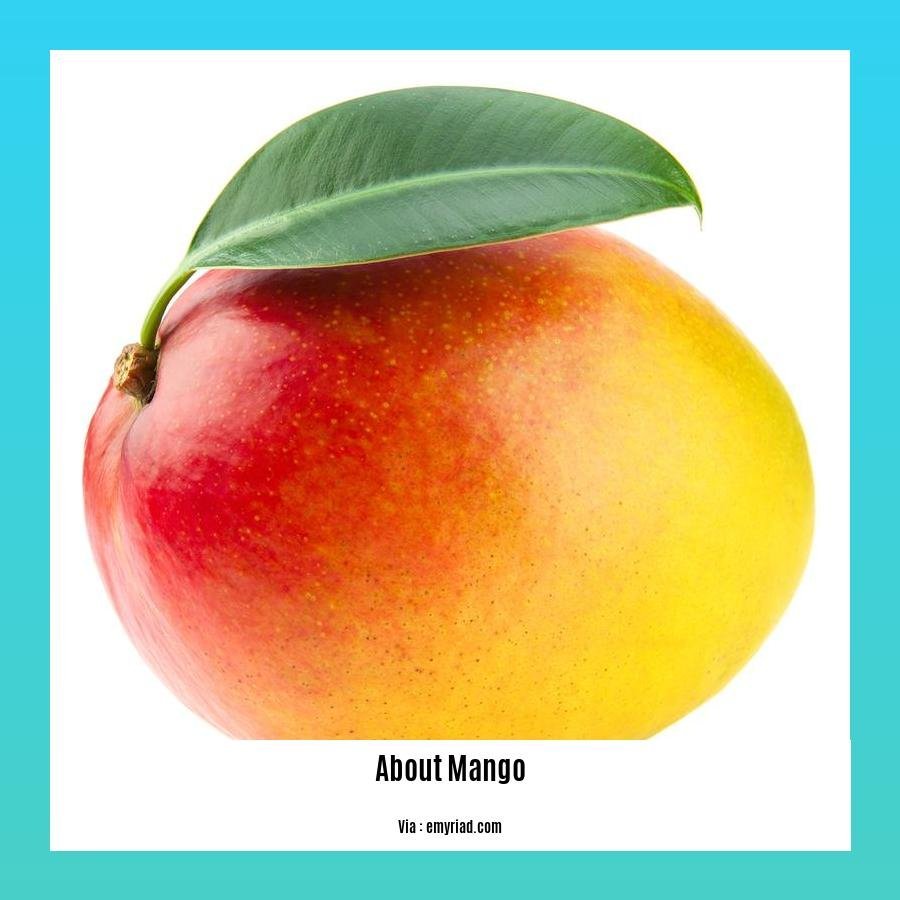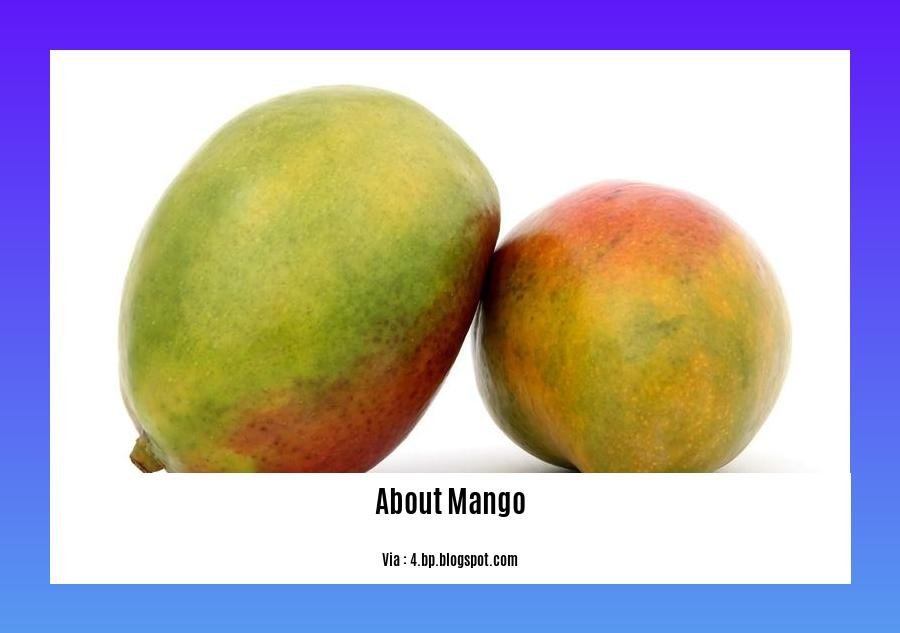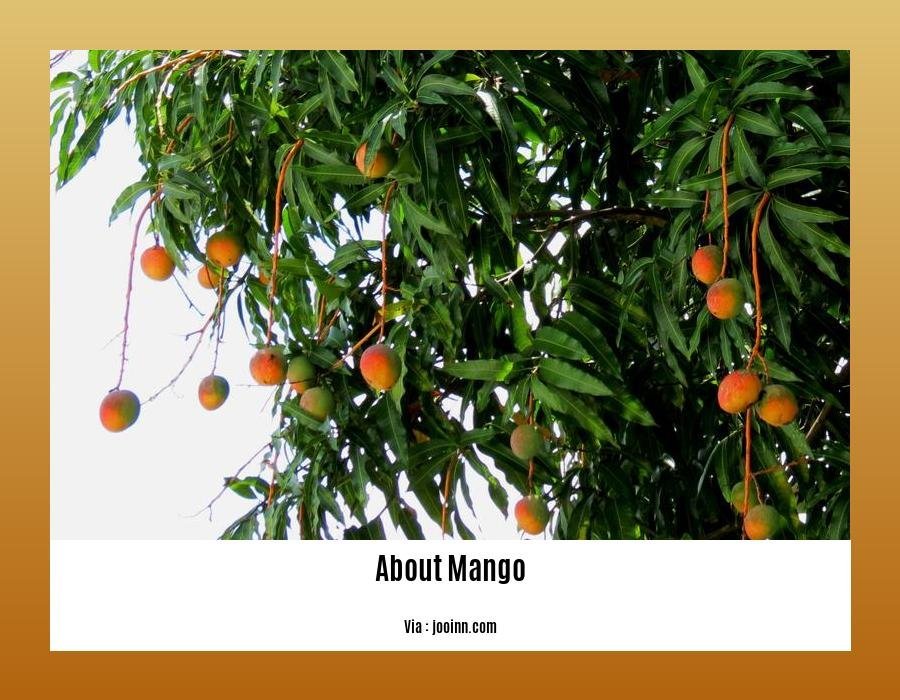Welcome to an enticing exploration of the captivating world of mangoes! In this article, we will delve into ten fascinating facts about this exotic fruit, ranging from its versatile nutritional benefits to the intriguing history of its cultivation. Whether you are a mango enthusiast or simply looking to expand your knowledge on this delectable fruit, get ready to indulge in a wealth of information on mango facts, nutrition, and much more. Discover the wonders of the mango plant and unlock the secrets that make it such a beloved and enticing tropical delight.
Key Takeaways:
- Mangoes are a popular fruit worldwide, with over 1,000 different varieties available, known for their sweet, tropical flavor.
- Mangoes are packed with essential nutrients, including vitamins A, C, and E, which benefit the skin, immune system, and cell health.
- India is the largest producer of mangoes, followed by China and Thailand, due to their ideal growing conditions.
- The word “mango” originated from the Tamil word “mangai” and has a long history of cultivation in India.
- Mangoes are the national fruit of India, Pakistan, and the Philippines, reflecting their cultural significance in these countries.
- Over 43 million tonnes of mangoes are produced globally each year, showcasing their widespread popularity.
- Mangoes are imported to the UK from various countries to meet the high demand.
- Mangoes are often called the “king of fruits” due to their taste, color, and health benefits.
- Mangoes are versatile and can be used in a variety of dishes, including smoothies, salads, salsas, and desserts.
- Mangoes have a rich history, dating back over 5,000 years, and are consumed in larger quantities than any other fruit worldwide.
10 Facts About Mango: Explore the Intriguing World of this Exotic Fruit

Fact 1: A Fruit of Many Varieties
Mangoes are unbelievably diverse, with over 1,000 different varieties available worldwide. Each variety possesses its own unique characteristics, flavors, and appearances. It’s almost like entering a treasure trove of mango goodness!
Fact 2: Nutritional Powerhouse
Not only are mangoes irresistibly delicious, but they are also incredibly nutritious. Packed with essential vitamins A, C, and E, mangoes play a vital role in maintaining healthy skin, boosting the immune system, and protecting our cells from damage.
Fact 3: India Leads the Way
When it comes to mango production, India takes the crown as the largest producer, followed by China and Thailand. These countries have the perfect combination of warm climates and fertile soil to cultivate these tropical wonders.
Fact 4: The Origin of the Name
The word “mango” traces its roots back to India, where this luscious fruit has a rich history of cultivation. Derived from the Tamil word “mangai,” the name perfectly captures the essence of this tropical delight.
Fact 5: The Fruit of Nations
Mangoes hold a special place in the hearts of many cultures. In fact, they are recognized as the national fruit of not one, but three countries: India, Pakistan, and the Philippines. Such a global love affair with mangoes speaks volumes about their cultural significance.
Fact 6: An Abundance of Mangoes
A staggering 43 million tonnes of mangoes are produced worldwide each year. This sheer volume is a testament to the love and demand for these juicy treats.
Fact 7: Flavor from All Corners
Thanks to their immense popularity, mangoes are imported from various countries to meet the demand in the UK alone. From India to Mexico, these juicy delights travel the globe to satisfy mango enthusiasts.
Fact 8: The King of Fruits
Mangoes have rightfully earned their nickname as the “king of fruits”. With their tantalizing taste, vibrant colors, and numerous health benefits, it’s no wonder they reign supreme.
Fact 9: Versatility at Its Best
Mangoes are incredibly versatile and can add a burst of flavor to a wide range of dishes. From refreshing smoothies and vibrant salads to mouthwatering salsas and indulgent desserts, their adaptability knows no bounds. You can even incorporate them into savory dishes for a delightful twist.
Fact 10: A Fruit Rooted in History
Mangoes have stood the test of time, with a 5,000-year cultivation history. No other fruit is consumed in larger quantities worldwide, making mangoes an icon among fruits.
So, there you have it—10 fascinating facts about mangoes that showcase their global appeal, nutritional value, cultural significance, and diverse culinary uses. Explore the world of mangoes and let their tropical charms sweep you off your feet!
Learn More:
– 15 Interesting Facts About Mangoes – OhFact
– BBC Radio 4 – Radio 4 in Four – 13 Juicy Facts About Mangoes
Cherries are not only delicious, but they also offer numerous health benefits. From boosting your immune system to improving your sleep quality, there are 10 health benefits of cherries that you can’t afford to miss out on! Discover these amazing benefits and how cherries can greatly improve your overall well-being. Click here to find out more about the amazing benefits of cherries.
Interesting Facts About Mango

Mangoes are not just delicious, but they also have a fascinating history and an array of intriguing facts that will leave you amazed. Whether you’re a mango enthusiast or simply looking to broaden your knowledge about this exotic fruit, here are ten interesting facts about mangoes that will captivate you:
Mangoes: A Fruit with Ancient Roots
Mangoes date back over 4,000 years: The mango is an ancient fruit with a rich history. Its origins can be traced back to more than 4,000 years ago, making it one of the oldest cultivated fruits in the world [^1^].
Hundreds of mango varieties: While you may be familiar with a few mango varieties, there are actually over 500 different types grown worldwide. These varieties vary in taste, size, shape, and color, offering a diverse range of mango experiences [^1^].
Summer fruit sensation: Most mango varieties ripen during the summer months, making them the perfect seasonal delight. From their vibrant colors to their irresistible aroma, mangoes bring a tropical vibe to the sunniest time of the year [^1^].
Mango: The Fruit with Surprising Connections
Tropical relatives: Did you know that mangoes are actually related to cashews and pistachios? These three delicious treats all belong to the Anacardiaceae family, which explains their shared flavor profiles and nut-like characteristics [^1^].
A drupe delight: Mangoes are classified as drupes, a type of fruit that has a single large seed or stone in the center. Other fruits belonging to the drupe family include peaches, plums, and cherries. So, the next time you enjoy a juicy mango, remember its drupe status [^1^].
Mango: A Fruit with Cultural Significance
Indian mango roots: Legends suggest that mangoes were first grown in India over 5,000 years ago. Their cultivation is deeply rooted in Indian culture, and to this day, India is often referred to as the “Mango Capital of the World” [^1^].
Fit for a king: Mangoes have earned the title of the “king of fruits” due to their delectable taste, vibrant colors, and numerous health benefits. This regal nickname reflects the high regard and reverence people have for this tropical delight [^1^].
Mango: A Fruit Packed with Nutritional Goodness
Vitamin C powerhouse: Enjoying a cup of mango provides you with a whopping 100% of your daily vitamin C requirement. This essential vitamin helps support your immune system, aids in collagen production, and acts as a powerful antioxidant [^1^].
A burst of flavors: Mangoes offer a wide range of flavors that go beyond the classic sweet and tangy taste. Some mango varieties boast hints of citrus, coconut, pineapple, guava, and even the rich and spicy characteristics reminiscent of a pumpkin pie [^1^].
Cultural significance in three nations: Mangoes hold immense cultural importance in three countries: India, Pakistan, and the Philippines. They are recognized as the national fruit in these nations, symbolizing their deep-rooted connection with this tropical treasure [^1^].
Sources:
1. Pittman & Davis. Fun Facts about Mangoes – Fresh from the Sunbelt
Key Takeaways:
– Mangoes have a history dating back over 4,000 years and come in over 500 different varieties.
– They are related to cashews and pistachios, belonging to the drupe family.
– India is considered the “Mango Capital of the World.”
– Mangoes are often referred to as the “king of fruits” due to their taste and health benefits.
– They are packed with vitamin C and offer a wide range of flavors.
– Mangoes are culturally significant in India, Pakistan, and the Philippines.
10 Facts About Mango Plant
Mango plants, also known as mango trees, are fascinating botanical wonders with a rich history and captivating growth process. In this article, we will explore ten intriguing facts about mango plants that will expand your knowledge and appreciation for these exotic fruits.
Fact 1: Harvest Once a Year
Did you know that mango trees are harvested only once a year? This annual harvest yields a bountiful supply of juicy mangoes, ready to be enjoyed by mango enthusiasts worldwide. The timing of the harvest varies depending on the mango variety and the geographical location of the orchards.
Fact 2: Pollination by Insects
Mango flowers rely on insect pollinators to achieve successful fertilization. Bees, butterflies, and other insects play a vital role in carrying pollen from one flower to another, facilitating the production of mango fruit. This natural pollination process ensures the continuation of mango tree reproduction.
Fact 3: Low Fruit Yield
Surprisingly, less than 1% of the flowers on a mango tree will develop into mature fruit. This low fruit yield is due to various factors such as inadequate pollination, environmental conditions, and competition among the developing fruits. As a result, each ripe mango becomes a precious treat.
Fact 4: Exceptionally Long Lifespan
Mango trees are known for their extraordinary longevity. These resilient trees can bear fruit for over 300 years, making them a testament to the marvels of nature. Their ability to thrive and produce delicious mangoes for centuries showcases the inherent strength and adaptability of the mango plant.
Fact 5: Nutty Relatives
Did you know that mangoes are related to cashews and pistachios? This fascinating botanical connection places mangoes in the same family as these beloved nuts. The shared ancestry offers a glimpse into the diverse world of drupe fruits, each showcasing their unique flavors and characteristics.
Fact 6: Patience is a Virtue
Mango cultivation requires patience, as it takes approximately 4 to 6 years for a mango tree to bear fruit. The seedling must undergo a period of growth and maturation before it can produce the delectable mangoes we all know and love. This waiting period highlights the significance of long-term planning and dedication in mango cultivation.
Fact 7: The Ripening Process
Once harvested, a firm mango will naturally ripen at room temperature within a few days. This ripening process is influenced by the release of ethylene gas, a natural hormone present in mangoes. As the fruit ripens, its flesh becomes softer, sweeter, and more aromatic, enticing our taste buds with its irresistible flavors.
Fact 8: India’s Mango Legacy
India holds the distinction of being the largest producer of mangoes globally. With 60% of the world’s mango production originating from the country, India truly stands as the mango capital of the world[^4^]. The long-standing cultural and agricultural traditions surrounding mangoes in India contribute to their exceptional quality and variety.
Fact 9: Nutritional Powerhouse
In addition to their delicious taste, mangoes offer an array of health benefits. They are a rich source of essential nutrients, including potassium, vitamin C, and vitamin A. These nutrients contribute to maintaining a healthy immune system, promoting good vision, and supporting overall well-being. So next time you savor a mango, know that you’re also nourishing your body.
Fact 10: Time-Honored Significance
Mangoes hold significant cultural and religious importance in many societies. In certain cultures, mangoes are incorporated into wedding ceremonies, symbolizing blessings and fertility. The spiritual and symbolic significance assigned to mangoes further adds to their charm and allure.
Key Takeaways:
- Mango trees are harvested once a year, resulting in a yearly supply of delicious mangoes.
- Insect pollinators play a crucial role in facilitating the pollination process for mango flowers.
- Less than 1% of mango flowers will mature into fruit due to various factors.
- Mango trees exhibit exceptional longevity and can bear fruit for over 300 years.
- Mangoes are botanically related to cashews and pistachios, belonging to the drupe family.
- Mango trees require patience as it takes several years for them to bear fruit.
- A firm mango will ripen at room temperature within a few days, becoming sweeter and more aromatic.
- India is the largest producer of mangoes globally, accounting for 60% of the world’s production.
- Mangoes are packed with essential nutrients, including potassium, vitamin C, and vitamin A.
- Mangoes possess cultural and religious significance in various societies, adding to their allure and charm.
Sources:
[^4^]: Softschools.com. (n.d.). “Mango Facts.” Retrieved from www.softschools.com/facts/plants/mango_facts/557/
FAQ
Q1: How many different varieties of mango are there?
A1: There are over 1,000 different varieties of mango.
Q2: What nutrients are found in mangoes?
A2: Mangoes are rich in vitamins A, C, and E, which are important for maintaining healthy skin, boosting the immune system, and preventing cell damage.
Q3: Which country is the largest producer of mangoes?
A3: India is the largest producer of mangoes, followed by China and Thailand.
Q4: What is the history of mango cultivation?
A4: Mangoes have been cultivated for over 5,000 years and were first grown in India.
Q5: How versatile are mangoes in cooking?
A5: Mangoes are incredibly versatile and can be used in a variety of dishes such as smoothies, salads, salsas, desserts, and savory dishes.
- Unlock Elemental 2 Secrets: Actionable Insights Now - April 2, 2025
- Lot’s Wife’s Name: Unveiling the Mystery of Sodom’s Fall - April 2, 2025
- Photocell Sensors: A Complete Guide for Selection and Implementation - April 2, 2025
















